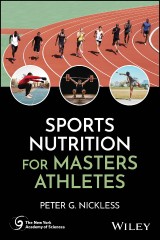Details

Sports Nutrition for Masters Athletes
New York Academy of Sciences 1. Aufl.
|
69,99 € |
|
| Verlag: | Wiley |
| Format: | |
| Veröffentl.: | 27.09.2024 |
| ISBN/EAN: | 9781119904311 |
| Sprache: | englisch |
| Anzahl Seiten: | 240 |
DRM-geschütztes eBook, Sie benötigen z.B. Adobe Digital Editions und eine Adobe ID zum Lesen.
Beschreibungen
<p><b>Discover the nutritional and physiological age-related changes and needs of athletes aged 35 and above</b> <p>Athletic activity is becoming increasingly central to the lives of many adults as they age. More and more adults over 35 participate actively in athletics. Additionally, older adults are increasingly encouraged to pursue athletics for reasons of health and wellness. There is a growing need, therefore, for sports nutrition and physiology texts that focus on this population in detail, and not simply as a subset of a field that has been primarily oriented towards younger athletes. <p><i>Sports Nutrition for Masters Athletes </i>meets this need with an intensive, evidence-based approach to the nutritional needs of athletes over the age of 35. Alert to the importance of diet in performance and the requirements of older athletes, the book offers a robust toolkit for maintaining athletic performance with age while adjusting for physiologic changes. The result is an essential contribution to a growing field of research and clinical practice. <p><i>Sports Nutrition for Masters Athletes </i>readers will also find: <ul><li> An overview of physiological changes associated with the aging process and their impact on performance.</li> <li> Detailed insights into the relationship between nutrition and the mitigation of the inflammatory process.</li> <li> Coverage of subjects including the determination of caloric and nutrient needs, dietary strategies, and many more</li></ul> <p><i>Sports Nutrition for Masters Athletes </i>is ideal for those pursuing education in nutrition, exercise science, exercise physiology, health and wellness, and physical education. It will also be of interest to those studying physical aging or work with older adults as clients and patients.
<p>1-Overview</p> <p> Introduction</p> <p> Demographic data</p> <p>2- Overview of physiological changes impacting aging athletes</p> <p> Cellular changes</p> <p>Metabolism</p> <p> Recovery</p> <p>Cardiovascular changes</p> <p> Nervus system changes</p> <p> Endocrine system changes</p> <p> Muscular system changes</p> <p> Skeletal system changes</p> <p>3- Determining caloric needs</p> <p> Basal Metabolic Rate (BMR)</p> <p>Factors influencing (BMR)</p> <p>Total Energy Expenditure</p> <p>Calculations for caloric requirements based on age</p> <p>Alternate methods for calculation caloric need</p> <p>3- Macronutrients</p> <p> Carbohydrates</p> <p> Absorption</p> <p> Metabolism</p> <p> Utilization</p> <p> Needs for older athletes</p> <p> Protein</p> <p>Absorption</p> <p> Metabolism</p> <p> Utilization</p> <p> Needs for older athletes</p> <p> Lipids</p> <p> Absorption</p> <p> Metabolism</p> <p> Utilization</p> <p> Needs for older athletes</p> <p> </p> <p> Determining macronutrient needs</p> <p> </p> <p>4- Micronutrients</p> <p> Water Soluble Vitamins</p> <p> Riboflavin</p> <p> Absorption</p> <p> Metabolism</p> <p> Utilization</p> <p> Needs for older athletes</p> <p> Continue for all water soluble vitamins</p> <p> Fat soluble Vitamins</p> <p> Vitamin A</p> <p> Absorption</p> <p> Metabolism</p> <p> Utilization</p> <p> Needs for older athletes</p> <p> Continue for all fat soluble vitamins</p> <p> Minerals</p> <p> Iron</p> <p> Absorption</p> <p> Metabolism</p> <p> Utilization</p> <p> Needs for older athletes</p> <p> Continue for all minerals</p> <p>5- Hydration</p> <p> Physiology of hydration</p> <p>Assessing hydration needs</p> <p>Hydration strategies</p> <p> Performance</p> <p> Recovery</p> <p> Impact of dehydration</p> <p>6- Supplementation</p> <p> Supplementation vs whole foods</p> <p> Assessing supplementation needs</p> <p> Weighing the evidence</p> <p> Common supplements</p> <p> Warnings with supplement use</p> <p> Ergogenic aids</p> <p>7- Inflammation</p> <p> Acute inflammatory process</p> <p> Chronic inflammatory process</p> <p> Sources of inflammation</p> <p> Inflammation and recovery</p> <p> Nutritional support for inflammation</p> <p>8-Special Populations</p> <p> Diabetes</p> <p> Obesity</p> <p> Cardiovascular disease</p> <p>Arthritis</p> <p> Disability</p> <p>9- Putting it all Together</p> <p> Establishing dietary goals</p> <p> Establishing performance metrics</p> <p> Determination of caloric needs</p> <p> Determination of macronutrient needs</p> <p> Determination of Micronutrient needs</p> <p> Developing a hydration strategy</p> Establishing a targeted supplementation plan
<p><b>Peter G. Nickless, DC, PhD, </b>is the Dean of Online Education and Director, Master of Science in Applied Clinical Nutrition at Northeast College of Health Sciences (formerly New York Chiropractic College) where he teaches in and oversees the Master’s degree program in nutrition. Prior to that Dr. Nickless was a clinical practitioner with a passion for working with athletes. Dr. Nickless has been an athlete throughout his life, competing in a variety of sports at levels from local youth sports to national events. Dr. Nickless remains active in masters level.
<p><b>Discover the nutritional and physiological age-related changes and needs of athletes aged 35 and above</b> <p>Athletic activity is becoming increasingly central to the lives of many adults as they age. More and more adults over 35 participate actively in athletics. Additionally, older adults are increasingly encouraged to pursue athletics for reasons of health and wellness. There is a growing need, therefore, for sports nutrition and physiology texts that focus on this population in detail, and not simply as a subset of a field that has been primarily oriented towards younger athletes. <p><i>Sports Nutrition for Masters Athletes </i>meets this need with an intensive, evidence-based approach to the nutritional needs of athletes over the age of 35. Alert to the importance of diet in performance and the requirements of older athletes, the book offers a robust toolkit for maintaining athletic performance with age while adjusting for physiologic changes. The result is an essential contribution to a growing field of research and clinical practice. <p><i>Sports Nutrition for Masters Athletes </i>readers will also find: <ul><li> An overview of physiological changes associated with the aging process and their impact on performance.</li> <li> Detailed insights into the relationship between nutrition and the mitigation of the inflammatory process.</li> <li> Coverage of subjects including the determination of caloric and nutrient needs, dietary strategies, and many more</li></ul> <p><i>Sports Nutrition for Masters Athletes </i>is ideal for those pursuing education in nutrition, exercise science, exercise physiology, health and wellness, and physical education. It will also be of interest to those studying physical aging or work with older adults as clients and patients.


















